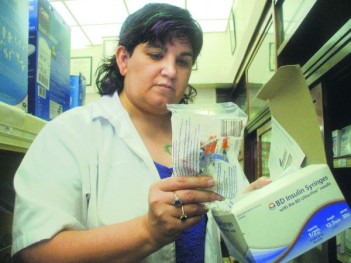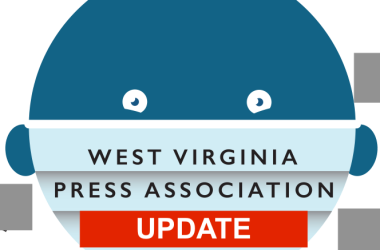
Patterson’s Drug Store owner Elaine Loizos-Hobday is happy to serve patients who are legitimately seeking syringes to be used for medical problems such as diabetes, but extra effort is required since some people are simply seeking needles to be used for shooting heroin.
MARTINSBURG, W.Va. — Since there is no state law requiring a prescription for syringes, Patterson’s Drug Store’s new owner, Elaine Loizos-Hobday, uses her professional experience – and even gut instinct – to determine who is legitimately wanting to buy needles at the shop’s downtown location.
That’s especially important now locally, since customers may honestly need the syringes to administer medicine to themselves, a family member or even a pet – but there’s also the possibility they are instead looking for needles for shooting heroin, she said.
“Basically each pharmacy has their own policy as far as selling syringes. Normally, if we know the customer, that makes a difference, but we will also have them sign something just to show what they picked them up for,” Hobday said.
Not every situation is as clear cut, however.
No stranger to the field, Hobday – who previously also worked at Patterson’s now-closed Inwood location – said her probing questions and strict standards helped establish a no-nonsense reputation in southern Berkeley County.
“When someone would come in and say they needed needles for their grandmother, I required them to bring in the bottle and talk to them about how many units she was using,” she said.
When an individual couldn’t answer questions about insulation dosages or other related issues, she knew that person probably wasn’t hoping to buy the syringes for a legitimate, medical use.
“If they said they needed 1,000 units, then you knew exactly that they had no clear what the needle was going to be used for – because it is normally 50 or 100 units,” Hobday said, adding that most heroin addicts also don’t know much about specific needle gauges.
“And after a while of doing this, word pretty well got around and people stopped coming into the store. But for a while in the beginning, there were quite a few who thought they could just come buy syringes without any question,” she said. “We don’t just hand them out to anyone who walks in here, and now they know it.”
MORE BAD NEWS LOCALLY AND STATEWIDE
At the state level, heroin overdose deaths have doubled since 2010, according to the West Virginia Bureau of Public Health data.
That’s not good news in Berkeley County either, which had the state’s second highest number of heroin overdose deaths last year with 24 people dying from this problem.
Heroin usage is even more important when considered in conjunction with the state’s rising hepatitis rates, which are now the highest in the country for hepatitis B -a number that has continued to rise in recent years, and one that state officials maintain is closely tied to drug users using dirty, contaminated needles.
This increase is believed to be the result drug users transitioning from prescription drugs to heroin, especially due to its widespread availability and cheaper price tag, state medical officials say.
“Here in the Eastern Panhandle there is also real reason for concern because of our rising hepatitis B and C rates in Berkely, Jefferson and Morgan counties. For example, the hepatitis C rates in Berkeley County showed 111 cases in 2012, but had increased to162 in 2013 – and it was up to 257 cases in 2014,” said Jefferson County Health Department Administrator Christina Jackson.
There was a similar increase in Jefferson County, where it went from 46 to 106 cases in that same two-year period, Jackson said, adding that Morgan County increased from six to 16 cases during that same time, she said.
“When you are looking at these numbers, it is a rather alarming jump. So we also need to understand why this is happening and if it is due to more drug use – heroin specifically – or perhaps it was partially under reported before. Still we need to know what is happening,” Jackson said.
“This is a good example of why it’s important to try and track disease progression,” she said.
A NEW ERA BEGINS
In addition to having the state’s highest number of heroin overdose deaths, Cabell County (which had 34 in 2014, according to preliminary data) is also plagued – not unlike the rest of West Virginia – with rising hepatitis rates-and those combined public health problems have gotten the attention of government officials at all levels.
But a new era is now dawning in the effort to fight these alarming trends, thanks to a collaborative effort between the City of Huntington, Cabell-Huntington Health Department and West Virginia Department of Health and Human Resources.
Officials announced the state’s first-ever syringe exchange program on Thursday at a press conference in Huntington- an event that had somewhat of a celebratory feel because lives will most likely be saved as a result of it, said Dr. Rahul Gupta, Bureau for Public Health commissioner and state health officer.
The overall goal of the pilot project is to help reduce the illnesses and infections often associated with intravenous drug users including hepatitis B and C, as well as HIV/AIDS, he said.
“I also especially like the fact that this is an all-hands-on-deck partnership because we need everyone involved in this, because we’ve got some real serious drug problems,” Gupta said.
Dirty needles are especially problematic because they may be passed from person to person, thus increasing the possible transmission of hepatitis or HIV, he said.
“We are very high in terms of hepatitis B, because we are 1,000 percent over the national average for it. And we have also had about a 500 percent increase for the national average of hepatitis C, so I think we are now rated No. 2 nationally for it -right behind Kentucky,” Gupta said.
Since the health department will oversee the program, individuals seeking clean syringes will also have the opportunity to have additional health testing (including screen and early treatment) and education, as well as consider resources (such as rehab programs) that may help with their addiction, he said.
“Because this is a pilot project, it will also give us an opportunity to look at the data and make sure we get this right before going onto other communities in the state. In this way we will be able to tweak it so that we have better outcomes and evaluation data,” Gupta said.
The state provided $10,000 in seed money to help get this project off the ground, and will also provide technical assistance as it continues throughout the next year, he said.
Both Gupta and other health department officials agree this is not the single solution to Cabell County’s heroin problem, but it is an important part of a harm reduction program that is already underway.
City of Huntington communications spokesman Bryan Chambers said this is part of the city’s ongoing efforts to address its “multifaceted” drug problems that largely originate with trafficking organizations in Midwestern cities.
As a result, the Mayor’s Office of Drug Control Policy was established in late 2014 by Mayor Steve Williams to “create a holistic approach involving prevention, treatment and law enforcement,” Chambers said.
“This strategy was born out of the recognition that drug use is not only a criminal justice problem, but also a public health and economic problem,” he said.
Overall goals include increased treatment, recovery, prevention and intervention as well as emphasis on research, education and advocacy efforts focusing on drug abuse/addiction issues, Chambers said.
In addition to expanding the county’s adult drug court program, which has applied for a grant to launch the Women’s Empowerment and Addition Recovery (WEAR). It will be a “specialized track within the current drug court that will expand services to the needs of drug-addicted prostitutes,” he said.
SAVING LIVES, SAVING MONEY
This new initiative is part of a harm reduction program that not only consists of the syringe exchange program, but also includes two other components – Project DAWN (Death Avoidance with Naloxone) to provide Naloxone training and kits for drug addicts’ friends and family members, as well as recovery coaches to help clients find detox resources, treatment, family support and education, Chambers said.
While it’s been estimated that the cost of syringes will cost $6,550 per year. that doesn’t begin to compare with health care costs for someone infected with hepatitis, he said.
“The health costs for a person with hepatitis B or C can range from $65,000 to $500,000 annually,” Chambers said.
– Staff writer Jenni Vincent can be reached at 304-263-8931, ext. 131.





